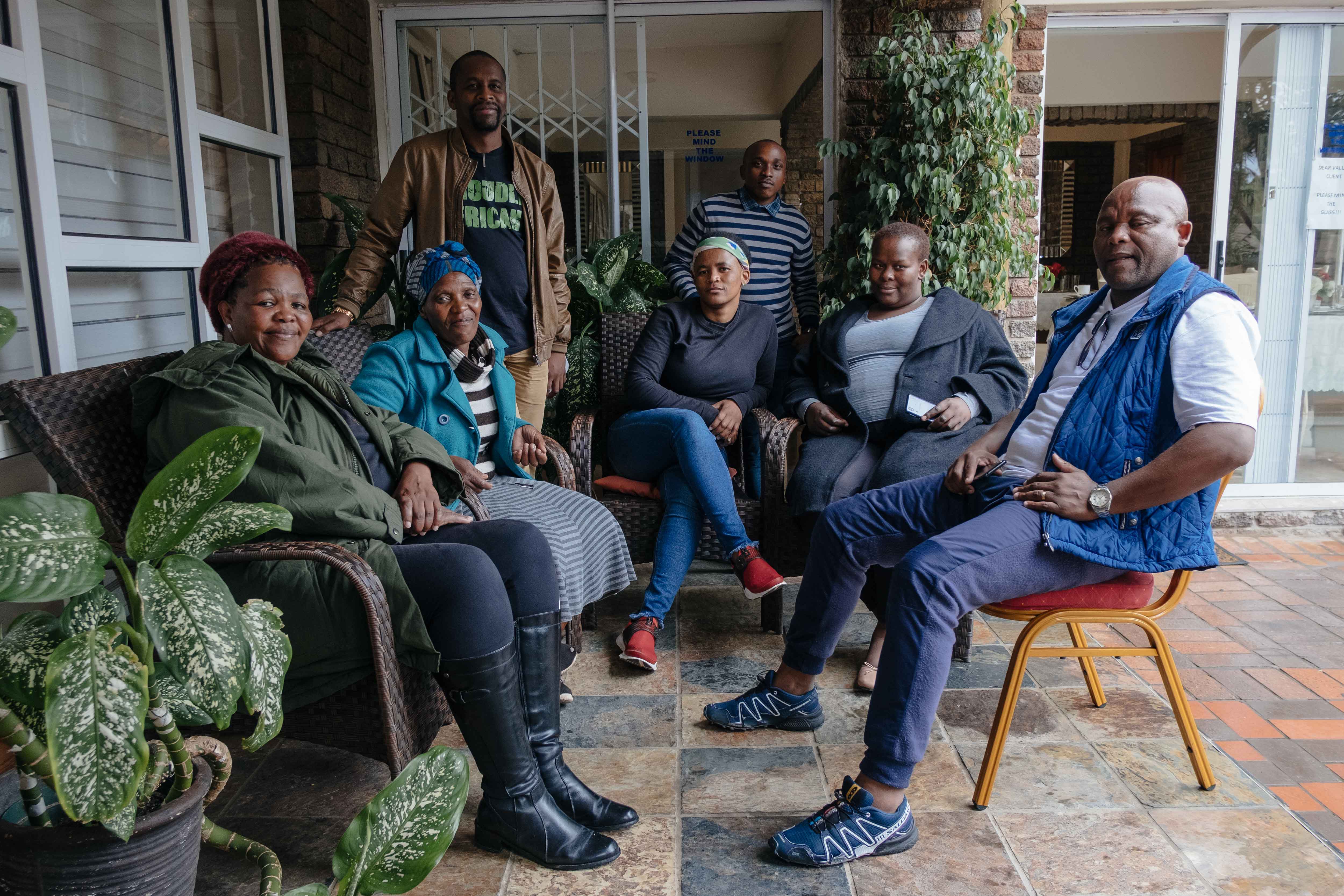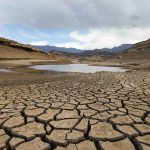Eastern Cape water crisis nears catastrophe
Angry residents and activists from the ‘disaster area’ of the Eastern Cape are pointing fingers at government mismanagement and misinformation concerning the water shortage.
Author:
5 December 2019

The water crisis in which many impoverished residents of the Eastern Cape find themselves in has as much to do with the drought as with the government’s mismanagement of funds, say activists and community leaders in the province.
In the small town of Elliot, about two hours drive inland from Mthatha, the level of the local Thomson dam is down to almost 16%. Residents have been told the water will run out in January if it does not rain, says George Nqoko from the Elliot paralegal office.
Meanwhile, in nearby Cala, “water comes from the East Drakensberg mountains and passes into the irrigation scheme and goes past us. The water is just passing us,” Nqoko adds, referring to the Tsomo River.
About 300km from Elliot and Cala, more than 110 villages in the Ngqushwa municipality surrounding the town of Peddie face the same stark reality.
Ngqushwa municipality resident Simthembile Kala says: “The mayor only tells us there is no water. What we are asking is, didn’t they know the water was going to run out?”
Poisonous water
Kala says people have been forced to retrieve water from small rural “dams” used by livestock, but this is not an answer and creates more problems. “People have izilonda [sores on their bodies] because of that water,” he says, explaining that cattle drown in those dams. “They get stuck in the mud, they break their legs trying to get out and drown as a result. Even donkeys drown in these dams. This is the same water that people drink,” she says.
In Nqamakwe village, 25km from Butterworth in the Amathole district municipality, the situation is similar. Resident Cynthia Jamjam says their river dried up, but it wasn’t clean when it was still flowing. “Goats, sheep, cattle drank from the river and human beings fetched water from the same river. Some animals are sickly and they share all those sicknesses with the human beings,” she says.

Nqoko and Kala were among the 75 activists from dozens of provincial organisations who told their stories at an Eastern Cape Climate Change Crisis meeting organised by the Unemployed Peoples’ Movement and Oxfam South Africa in East London, in the Buffalo City Metropolitan Municipality, in November.
The activists from rural villages, small towns and major cities all over the province travelled hundreds of kilometres by bus and taxi to draw up a plan of action for communities to tackle the climate change crisis and survive the severe drought.
Speaking in the tiny, crowded conference room of a guesthouse, Kala said local government should have piped water to the Peddie villages from the Fish River about 65km away, but failed to do so. She was not alone in her criticism of government.

Government lies
Fuya Mankeya from Peddie said: “We in the rural areas are facing painful challenges. The government does not like to see us united like this because they know we are going to come up with a solution. They don’t like us to come up with solutions. The department of agriculture is useless because they have not given us anything. They are liars, they went to school to tell lies.”
Govana Yanga from the town of Mount Ayliff and the Alfred Nzo District Development Initiative Movement, which addresses gender awareness and takes a stance against gender-based violence, lambasted the local municipality. She said it had allegedly budgeted to buy 1 000 water tanks for the community, but less than 500 tanks had been purchased to date. “The rest of the money vanished,” she said. “It got lost in the middle and nobody knows what happened to it.”
Related article:
As a result, she said, communities in Alfred Nzo were now reliant on water being delivered by truck. “There are 14 to 15 trucks to transport water on a daily basis, but there is a lack of drivers and diesel. If today they have diesel then they don’t have drivers, so we don’t have access to day-to-day water.”
In the town of Mount Frere, people have to queue for water from taps that are only open for a few hours each day, said resident Nosintu Mcimeli. “Disabled people have to pay others to fetch water for them and they struggle to get someone who is available every day to go at the times that the taps are open. So the disabled don’t get water every day. The sick are also affected because some clinics ask you to bring your own bucket of water when you come, which is not always possible.”
The Fighting for Justice Water Coalition in the Western Cape was invited to attend the meeting to share its experiences. The coalition’s co-ordinator, Naomi Betana, who comes from the town of Ceres, said the Western Cape provincial government had responded to drought in rural areas by threatening to install prepaid water meters in the homes of people who have registered as low-income households with the municipality’s indigent programme.
Water down the drain
“Industry is currently sitting on boreholes and wasting water left, right and centre,” she said. “But government wants to come to the poor and says we must manage our lives. Government is protecting the capitalists. We don’t have anything left. When they say you must organise your budget, we don’t have a budget because we are poor. When they talk about training the communities to manage water, we don’t have water to manage.”
The Eastern Cape provincial government declared the province a disaster area three weeks before the meeting, after dams had either already dried up or the water level had dropped so low that pumping water was no longer an option.
Related article:
Some parts of the province have not experienced heavy rain since 2014. Activists voiced concern that despite the crippling drought, government had allocated just R120 million to fix the problem, including R74 million in funding for emergency feed for livestock to be shared by all the commercial and small-scale farmers in the province.
“It tells us there is no commitment. We are left on our own. We are in big trouble,” said Ayanda Kota from the Unemployed Peoples’ Movement in Makhanda.
Only God can help us
Villagers have no choice now but to buy water from the commercial truck drivers who pass through districts selling water. “We want to appeal to the government to come on board, because even the water we are buying is scarce and our animals, our investment, are dying as well. If government doesn’t help, yoh! Unfortunately, the only thing is to kneel and pray and ask God to deliver us from these governments that are anti-people,” Jamjam said.
The activists facilitating the meeting wrote up the key problems on flipcharts lining the walls. These included no government strategy to provide water to impoverished and working-class communities, and the government’s failure to come up with innovative ways to combat the current drought.

Other conclusions reached were that poor governance in most Eastern Cape municipalities means there is no just or equitable water provision in the province and that women, children and disabled people are most affected. Rampant corruption combined with the severe drought means some communities are left without water.
“Our water access challenges arise from climate change that leads to drought. You can mitigate the severity of drought but the state seems quite keen towards a private agenda, introducing pre-paid water meters for example. These are some of the issues we must challenge” said Mthandazo Ndlovu, Oxfam’s democracy and governance manager.
An action plan was agreed, including initiating joint actions across the province aimed at forcing the government to spend public funds on water projects, and a campaign to highlight local examples where public funds meant for water go missing or are spent inappropriately.
Responding to the activists, Mvusiwekhaya Sicwetsha, spokesperson for Eastern Cape premier Oscar Mabuyane, confirmed that R74 million had been allocated for livestock feed and R80 million for the “provision of water to households through drilling, equipping boreholes, water treatment package plant, groundwater package plant storage, purchasing of water carting trucks, purification system, water tanks in all affected district and local municipalities of the province”.
He said the spokesperson for the Eastern Cape Department of Cooperative Governance and Traditional Affairs (Cogta), Mamkeli Ngam, would be able to supply an update on how that R80 million was being spent.
When Ngam was approached, however, he didn’t answer this question directly, but said simply: “Please be advised that Cogta has done some work, including budget breakdowns per municipality including the purchasing of water tankers, trucks drilling of boreholes, etc. Further details will be divulged in due course. Anybody with evidence on corruption-related issues should go to the nearest police station and open a case.”



